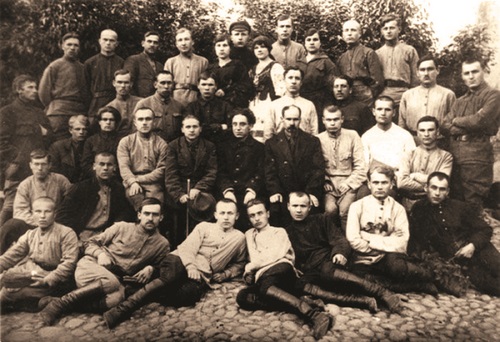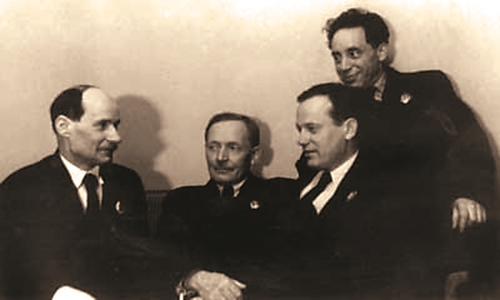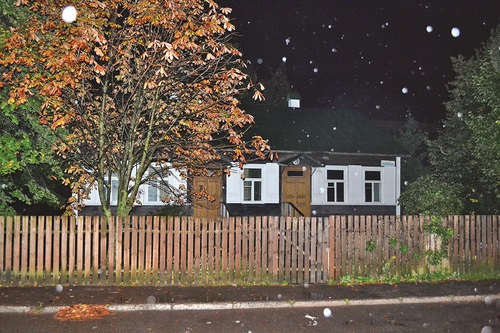This April, we celebrate 130 years since the birth of Z. Byadulya (originally Samuil Yefimo-vich Plavnik). His family home can still be seen in the village of Posadets, near Zarechie, in Logoisk District of Minsk Region (formerly Vilnya District of Vilnya Province). The five walls stand yet, and are well known locally. The Jewish Plavnik family was modest, and none could have guessed that Samuil would become a famous writer, as well as a friend and colleague of such Belarusian writers as Yanka Kupala, Yakub Kolas, Tsetka (Aloiza Pashkevich) and Maxim Goretsky. He was the ‘sworn brother’ and ‘close friend’ of Maxim Bogdanovich, who dedicated his life to Belarus and creativity.

Seeking light and pleasure
Zmitrok Byadulya began his ‘creative career’ in Vilnya, with ‘Nasha Niva’: the newspaper of the common people. At the beginning of the 20th century, this edition led the Belarusian Renaissance, attracting the lucid minds of poets, educators, artists, scientists, and all who were patriotic. Yanka Kupala, Yakub Kolas, Maxim Bogdanovich, Bronislav Epimakh-Shipilo, Maxim Goretsky, Yadvigin Sh. (Anton Levitsky) and Tsetka each told Belarusians about their inner world, expressing kindness and patience, humanity and beauty, as well as showing their talent: qualities of tolerance.
The voice of ‘Nasha Niva’ resounded in distant corners of Belarus, helping shape the consciousness not only of lower strata workers but of upper hierarchies, destroying the view of people as pure labour. Through the newspaper, thoughts took shape, encouraging people to be ‘free’, to express individuality and embrace culture and spiritual concepts. Such thoughts rang through to the soul of young poet Byadulya, who began subscribing to ‘Nasha Niva’ in 1909. He was especially drawn to the work of Yanka Kupala, and wrote to the editorial office, requesting the address of the poet. Byadulya perhaps had a sixth sense that his destiny would be closely connected with ‘Nasha Niva’. Belarus had given shelter to his soul, making it impossible to turn away from disturbing events in cultural and public life.
Very soon after acquaintance with the newspaper, Byadulya began writing verse and articles in Belarusian language, sketching the life of Belarusian village peasants, whom he’d met in Posadets. He wrote about their unhappy lot, and lack of schooling opportunities. The editorial office chose to continue co-operating with the young author, who wrote in journalistic style, focusing on the hardship of peasant life.
The editorial office advised him to ‘write reports that are interesting and have value for us’. There followed an invitation to work with Belarusian cultural organizations and, in 1912, Byadulya began working with ‘Nasha Niva’ as a secretary, hired by Yanka Kupala, who was working with the newspaper as an editor.
Byadulya gained fame among Belarusian writers. As the wife of Kupala, Vladislava Lutsevich, recollects, Yadvigin and Tsetka showed interest in his work, while Yanka Kupala respected Byadulya for his talent and work ethic. The two became close during the harsh war years of 1914-1915, and did their best to keep the star of Belarusian renaissance blazing. According to Vladislava Frantsevna, both were responsible for writing, proofreading, and issuing the newspaper, bearing responsibility for its survival. Though they tried to write carefully, changing pseudonyms, military censorship always found something to complain about, obliging almost every issue to be published with blanked out spaces.

The power of land
Byadulya continued to hold dear his Jewish ancestry, explaining in 1918, via his newspaper articles, that Jewish people had just as much ‘love’ for their homeland as any other ethnicity or nationality. He noted that anything else would be ‘against the laws of nature’. Byadulya researched the assimilation of Jewish people in Belarus, and the inter-influence of Belarusian and Jewish cultures. His ‘Jews in Belarus’ pamphlet has some interesting arguments on the impact of a land on a person born there, exploring how our soul vibrates in harmony with the energy of a place. Being Ukrainian myself, I’ve more than once felt that impact; in 1996, my husband and I hiked for four months around the border of Belarus, and can hardly describe the mystical feelings of that time, and the way that Belarusian language streamed from us.
Here is how Byadulya writes about it: ‘Local scenery has such great power, influencing other cultures to move in the opposite direction. The people of our region who wrote in Russian or Polish and gained literary fame did not diminish the spirit of Belarusian lands, which continued to live in their hearts. These writers were known as Belarusians. The laws of Belarusian-Lithuanian princedom were written in Belarusian, and the court language of Lithuanian princes was Belarusian. The Lithuanians still complain that many Lithuanian farmers are similar to Belarusians, showing the impact of Belarusian culture. It’s no wonder that Jews living in their adoptive country of Belarus, took more from local culture than local culture adopted from them. The powerful force of Belarusian lands inspired Belarusian Jewish families spiritually and in other ways’.

Zmitrok Byadulya and Yakub Kolas among the students of the BSU worker`s` faculty, 1922
Living, and creating beauty
Every creator has something special marking them out from others. Byadulya was not only joyful but had an outlook that was ethereal, seeking rays of light in each person he met. Vladislava Lutsevich wrote: ‘More than once, in personal conversation, Byadulya complained of social injustice making people harsh. Everywhere, he looked for a gleam of light, for that which was joyful’. Later, in his theatrical and critical speeches, Byadulya noted art’s enormous influence.
I must highlight articles by Byadulya from ‘Nasha Niva’: ‘Not by Bread Alone’, ‘To Life’, and ‘The Light’. I can see his cosmic vision, which incorporated the philosophical and religious thought of the East, as well as world culture references, and those from the Bible. His articles indicate his belief that the world is unified, and inter-dependent. He saw the va-lue of life ‘not in the chosen one’ and not in ‘supreme man’, but in those who aspire to cultural creativity. Byadulya tried to convey his dreams, wanting others to understand.
How do we awaken creativity? Byadulya was excited to explore this question, believing that simple language should be used to awaken people’s sensibilities, so that they would recognize their own unique individualism, and realize that every one of us has equal ‘value’. For Byadulya, words had power. He wrote: ‘Words are the soul of living people and of those who have fallen into oblivion. They explore the human condition… imbibed with mother’s milk, which is dear to us. Words soothed us in the lullabies of our mothers, while laughter and tears permeated the souls of past generations... Centuries-old words, like the sacred Gospel, are handed down, as legends are, gradually perfected, until they harden like Damascus steel, becoming both sharp and flexible. They adhere to us and are reflected in our mentality; they become part of our soul, inspiring creativity for our whole life’.

Yakub Kolas, Yanka Kupala, Petrus Brovka and Zmitrok Byadulya,1939
Byadulya viewed all human life as having infinite creativity. He saw us as creators, capable of expanding our horizons constantly, and he believed in the spiritual progress of mankind. For Byadulya, living meant the creation of beauty, which exists in all things: in our lives, our work, our relationships, in nature and in art. He urged us to pass down our unique fairy tales and songs, to study customs, and folklore. He felt the power of national culture to help us understand our inner world, and our soul.
Like other creative people, such as Kupala, Kolas and Goretsky, he wished to voice his mission and beliefs publically. Byadulya strengthened his own understanding of Belarusian concepts through his writing: including history, national ideals, culture and spiritual-educational activity. Writing for ‘Nasha Niva’, he encouraged a national renaissance, promoting poetic thought and expression.
Working at the Institute of Belarusian Culture, in the 1920s, as secretary of the Humanitarian Department, he was able to tour the country, collecting ethnographic and folklore materials, to inform his articles. Writing of national improvisation, he stated: ‘Volumes and collections of Belarusian folklore written by various ethnographers and scientists do not have a hundredth part of all that is on people’s lips’.
Byadulya preferred to chat directly with people, capturing ideas from the sea of people’s thoughts: the essence of the soul of the Belarusian-grain-grower, so ‘distinctive’ and ‘mysterious’. He studied the soul of Belarusian woodcutters, craftsmen, and peasant-farmers, listening rapt, remembering and committing to paper oral verse and folklore, including proverbs, witty fairy tales and fables, lyrical songs and epic ballads. Folk motifs appear throughout his verse, and tales, as well as in his articles.
In the 1920s, he wrote on the history of Belarusian theatre, including on a puppet show of the nativity. He wrote critically, as well as poetically and philosophically. While his emotional articles are easy to read, you can detect a layer of undeclared thought, deep and mystical, as is usually beyond the power of language.
Following the Congress of Pea-sants, in 1917, he wrote: ‘Where there is a ray of hope, there is always enough bread. There should be culture, so that no land goes to waste. Culture and peace are what peasants aspire to.’

House in Rabkorovskaya street in Minsk, where Zmitrok Byadulya lived
Apostle of language and enlightenment
Byadulya sought to make sense of life. During Soviet times, as writer Victor Kovalenko wrote in his book ‘Search and Fulfilment’, Byadulya aspired to reveal artistic truths. He aspired also to be an apostle of language and culture, which he called ‘rays of hope’. For him, culture allowed education, opening our eyes, leading us to comprehension of national identity and cultural fulfilment.
In this way, he was interested in all spheres of cultural activity, including theatre. From 1921 until 1924, he headed the literary department of ‘Savetskaya Belarus’ newspaper, and edited the children’s magazine ‘Zorki’. He worked then at the Institute of Culture of Belarus, and edited the regional magazine ‘Nash Krai’. He made progress in his own understanding but continued to strive to bring knowledge to others.
Byadulya found the eternal and universal human condition well explored through drama and theatrical works, believing it to encapsulate national culture. During Soviet times, he promoted Belarusian folklore concepts on stage, believing them to be at the heart of true beauty, which he always admired. Most of his articles on theatre recommended the exploration of folk motifs, urging a return to spiritual roots. He wanted Belarusian culture to take its place within world culture with dignity. His knowledge of the age-old folk mythologies of Belarusians allowed Byadulya to explain his studies clearly, arguing Belarusian folklore to be among the richest not only of Slavonic people, but of Indo-European people. He embraced the inner world of simple people, and its theatrical expression, believing the latter capable of conveying beauty and spirituality, modelling the virtues, as in the traditions of oral story-telling and ballad performance.
Byadulya reviewed performances and wrote articles on the history of Belarusian theatre. He was a founder of Belarusian professional theatre criticism, considering all matters connected with dramatic art, direction and acting, as well as the use of sets and special effects: all that makes a play a performance. His cultural background, and knowledge of literature, and several languages, allowed him to set the bar high for fellow critics. He wrote that, in order to be a critic, you must have no only ‘artistic talent’ but be ‘an artist’. He stated: ‘Sometimes, it’s necessary to understand the author from a half-word, or guess at what the author intended. A critic should understand the inclinations of the author, his strengths and weaknesses’. It was this professional understanding that he aspired to all his life.
The early 1920s saw much change, as the new Belarusian theatre came under the direction of Vladislav Golubok, opening on August 10th, 1920. On September 14th, the Belarusian State Theatre launched. These professional theatres encouraged criticism to grow, developing its own terminology and criteria. Byadulya’s articles on ‘Our Theatre’, and ‘Theatre and Education of the Masses’ are works of art in themselves, showing Byadulya as an historian, theatre critic and publicist. His passion is evident.
In conclusion
Byadulya had two hearts beating in his breast: two muses calling him. One was dark-haired, looking from tearful eyes, her face mournful, whispering remembrances of his Jewish blood. The second had hair pale as linen. She held a psaltery and sang of Belarusian lands, calling: ‘My land raised you, my crop-growers reared you... Your Jerusalem is here, in these woods and valleys that gave you physical and spiritual strength’.
By Valentina Zhdanovich











